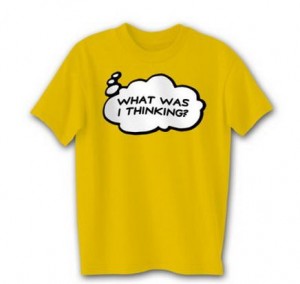 As consumers we have many choices of what we do and how we spend our money. Given too many choices we get overwhelmed and tend to do nothing. Ninety-eight percent (98%) of the time, however, we rely on our subconscious to make decisions. Scientists tell us this is a good thing as our brains are not able to process the millions of information bits thrown at us daily. If we had to think about everything we do, our days would be filled with just getting through our breakfast menu.
As consumers we have many choices of what we do and how we spend our money. Given too many choices we get overwhelmed and tend to do nothing. Ninety-eight percent (98%) of the time, however, we rely on our subconscious to make decisions. Scientists tell us this is a good thing as our brains are not able to process the millions of information bits thrown at us daily. If we had to think about everything we do, our days would be filled with just getting through our breakfast menu.
rational thinking only represents 2% of decision making
As business people we know the importance of telling customers about the features and benefits of our products and services, so that any thinking person would be compelled to make a purchase. The trouble with this “rational thinking” approach is it only targets 2% of the decision making process and not the 98% of the buyer’s subconscious driven actions. This helps to explain why customer behavior is so often misunderstood and may explain, for example, why 75% of customers in surveys say they are satisfied right before they leave. Of course, measuring customer satisfaction can be helpful in spotting trends; the problem is using a customer satisfaction survey to understand customer thinking or justify getting a good night sleep is misguided.
You need the courage to run experiments
How many times have you thought, “we just need a better website”, or “better leads.” Don’t be surprised if one more communication or one more survey, doesn’t lead you to the Promised Land. Knowing if customers are happy or what will make them purchase is more complex. You need the courage to run experiments and observe firsthand what works and what doesn’t. Beware of gator brains reactions from those that think they already know the answers. Don’t let unproductive thinking get in your way. See related post –Innovation Squelchers: Pattern Thinking, Biases, and Gator Brains
In the next issue of the What’s Next newsletter we’ll share a free and simple exercise that enables you to detect pattern thinking in yourself as well as others.
Signup for the What’s Next newsletter

